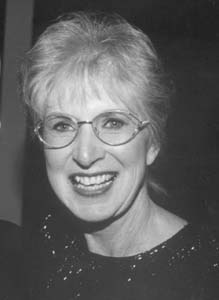![[Metroactive Music]](/music/gifs/music468.gif)
[ Music Index | San Jose | Metroactive Central | Archives ]
Holst in Orbit at Flint
SJ Symphony takes a tour of 'The Planets' with William Boughton at the controls
By Scott MacClelland
WILLIAM BOUGHTON sent in his passport ahead of time. The conductor who just made his debut with the San Jose Symphony in an all-British program introduced himself to American music lovers in the 1980s through a large corpus of CD recordings on the Nimbus label. In his performance Sunday at Flint Center, Boughton displayed a commanding presence borne of long-term familiarity with Elgar's In the South and Holst's The Planets, plus a deft hand with Christopher Rouse's Concerto for Flute and Orchestra.
Of course, Rouse is an American (whose ancestors emigrated from the British Isles before the Revolutionary War), but his concerto is Celtic in spirit, inspiration and content. Even if Boughton, whose career has concentrated on the music of his countrymen, had shown no affinity for the Rouse, flutist Maria Tamburrino gave the work abundant personality and performance flair.
In particular, Tamburrino probed the arching melodies in the outer movements and the central elegy with deep feeling. These episodes, separated by smart showpieces, reflect on the murder of a 2-year-old boy by two 10-year-olds near an English retail mall. Just as she conveyed the sorrow inspired by this horror with grace, Tamburrino became a darting elf in the march and scherzo movements.
Rouse writes fearlessly for large orchestra but with not less than a fine hand for variety and the details of color and effect. His ideas were handsomely rewarded here.
Boughton opened his program with the inexplicably rarely played In the South. Unique among Elgar's works, this tone poem, composed at Alassio on the Italian Riviera during the winter of 1904, flexes as much muscle as the egoistic orchestral tapestries of Richard Strauss.
The orchestra worked up a splendid account of the piece, especially in the powerful, wind-heavy declamations and the nocturnal viola solo played with hushed authority and rich tone by Patricia Whaley. If anyone today can claim Holst's extraterrestrial masterpiece as a signature, it is Boughton. He has played the piece countless times and has developed a detailed account that pours light into all of its many regions and mysteries.
For reasons more musical than astronomical, The Planets starts with Mars, works its way through orbits closer to the sun, then jumps out to the domain of the gaseous giants. In this reading, the orchestra escaped conventional gravity to embrace the adventure enthusiastically and with spectacular results.
Although it is possible to play the piece with fewer musicians, the full complement here made for the true impact of the composer's intention--and not least for the vividly colorful orchestration and contrapuntal depth of the score. (In fact, Holst's command of counterpoint informs most of his music and stands as a textbook example for anyone who would be taken seriously as a composer.)
An organ supplied subwoofer sonorities at various points as the seven movements paraded by, starting with a fiercely aggressive Mars. Boughton encouraged the timpani to underscore the menacing militarism of the unrelenting string figure than has been imitated by so many film composers.
If men are from Mars, then concertmaster Robin Mayforth is from Venus in giving solo voice to the feminine alternative. The mercurial winged messenger's quicksilver is reflected in celesta and metal percussion. In going for the gas, Jupiter (the bringer of jollity) develops three distinctive themes, including a Victorian-style hymn tune that imitates Elgar and brings the suite closest to rousing patriotic emotion. Boughton could have, but did not, linger over it.
The women of San Jose State University's choirs, backstage and cued by television monitor, added their ethereal presence to Uranus, drifting away to silence (and from accurate pitch) after the orchestra completed its itinerary and Boughton rested his baton.
[ San Jose | Metroactive Central | Archives ]
Copyright © 1999 Metro Publishing Inc. Metroactive is affiliated with the Boulevards Network.
For more information about the San Jose/Silicon Valley area, visit sanjose.com.
![]()
 Vocal Voyager: Dr. Charlene Archibeque led the choirs through 'The Planets.'
Vocal Voyager: Dr. Charlene Archibeque led the choirs through 'The Planets.'
From the November 24-December 1, 1999 issue of Metro, Silicon Valley's Weekly Newspaper.